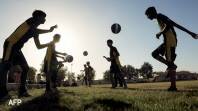It seems like a story from another life. It was the summer of 1984 and I was just getting old enough to love and follow sports. It was also the first time that I fell in love with Olympics, learning why they call it the greatest show on earth. Los Angeles were Carl Lewis’s Games. The star American athlete struck four golds, including the prized 100m crown with an enviable ease. But the ‘84 Olympiad also belonged to Pakistan, at least on the hockey field. They seemed out-of-form during the early stages of the tournament but peaked at the right moment to beat title favourites Australia in the semis and West Germany in the final. For several weeks Hassan Sardar, the mercurial striker who scored ten goals in Los Angeles, was Pakistan’s favourite son. To me, he was a bigger hero than Imran Khan or Javed Miandad, at least for the time being.
But all good things come to an end. The Los Angeles triumph was the beginning of the end of Pakistan hockey’s golden era. They did bounce back for a while in the Nineties by winning the Champions Trophy in Lahore and the World Cup in Sydney — both in 1994 — but on the whole Pakistan have been mostly out of the topfour during the last three decades. That’s a huge climbdown for a team that for years ran roughshod over its rivals and won title after title almost at will. After winning their third gold in Los Angeles, Pakistan have failed miserably to revive their Olympic fortunes. They did win a bronze in 1992 in Barcelona but otherwise they’ve always returned empty-handed from Olympic fields.
If current form is any guide, a similar story is about to repeat itself in London. Unless the green shirts manage to pull off some kind of a miracle, that is. They’ve been training hard and talking big in the lead up to London 2012. They’ve been stressing that any team taking them for granted would be doing so at its own peril. They’ve been talking about reviving Pakistan’s long lost glory and believe that with hard work and dedication they can achieve mission impossible. In spite of their below-par track record, Pakistan have time and again proved that they have the potential to cause upsets. Back in December 2010, Pakistan pulled off a surprise when they regained the Asian Games crown in China. But like our cricketers, Pakistan’s hockey players are also an inconsistent lot.
In recent times, they’ve finished rockbottom in World Cup (2010), second-last at Champions Trophy (2011) and last at Sultan Azlan Shah Cup (2012). Such results hardly inspire any confidence going into an Olympiad. To add to Pakistan’s woes, the country’s hockey chiefs sacked the team’s Dutch coach — Michel van den Heuvel — just a few months before the Olympics. The Dutchman, they said, was violating clauses of his contract by working for a club in Europe.
In London, Pakistan would be up against top teams like world number one Australia, Spain and hosts Great Britain in Pool A. Even lower-ranked opponents like Argentina and South Africa could turn out to be tough teams to beat for the Pakistanis who were humbled 6-1 by Belgium in a Test match in Antwerp just weeks before the Olympics. But the surprising, and perhaps encouraging, fact is that the team remains upbeat in spite of the gloomy scenario. “Ours is a good team that’s capable of producing positive results in London,” Sohail Abbas, the Pakistan captain, says. “We have prepared hard for the Olympics and there is a lot of self belief among the boys. I’m confident that we will do well in London,” he adds.
Sohail is by far Pakistan’s most important player. He has the experience and with more international goals under his belt than any other player in hockey’s history, the drag flick expert should play a key role for his team. “There is no doubt that Sohail is a very important player for us. Not just because he is the team’s captain. It is also because of his experience and his expertise as goal-scorer and perhaps, more importantly he is the biggest role model for all the younger players,” says Khawaja Junaid, Pakistan’s coach. Apart from Sohail, other key players for Pakistan include comeback strikers Shakeel Abbasi and Rehan Butt. With plenty of experience — and international goals — Abbasi and Butt would shoulder most of Pakistan’s assault responsibilities.
Another key player is midfielder Waseem Ahmed. The diminutive Waseem is the second most capped hockey player at London 2012. “A lot of our hopes would rest on how our senior players fare in London,” explains Junaid, a former Olympian. “They are the ones who have to lead by example and inspire their younger teammates to give their best.” Pakistan have pinned their hopes in senior players by recalling the trio of Butt, Abbasi and Waseem just weeks before the Olympics. It was a desperate move to bolster the line-up after Pakistan flopped in Ipoh earlier this summer. Team officials are hoping that the seniors would live up to expectations and guide Pakistan to a respectable finish at London 2012. 102 I August, 2012 At best, it seems like a gamble. Pakistan had decided to discard aging players like Waseem soon after last December’s Champions Trophy. The reason behind that move was the fact that hockey, with its ever-increasing focus on speed and strength, is not kind on 30 something players.
“What you need to make a good team are talented youngsters who can keep up with the pace of the game full time,” says Shahnaz Sheikh, the former Pakistan captain, who is now one of the biggest critics of the Pakistan Hockey Federation (PHF). “The biggest misfortune for Pakistan hockey is that in spite of making tall claims, the PHF has not produced any world class player in the last several years and is now forced to bring back previously discarded seniors for the Olympics,” he adds. But it’s not that Pakistan’s Olympic squad has no youngsters. Several squad members were till recently part of the national junior team. One of the key junior players is goalie Imran Shah. He was preferred over the seasoned Salman Akbar and team officials believe that his showing in front of the goal would be vital for Pakistan.
“Imran is very talented and as the team’s goalie has a major responsibility,” says Shahid Ali Khan, Pakistan’s goalkeeping coach. “His performance can make or break our chances because in today’s hockey the goalkeeper is your most important player.” Hockey, as usual, remains Pakistan’s only medal hope which is why it’s important for Sohail and Co to click. “I’m confident that our team has the potential to bounce back,” says Qasim Zia, the PHF president. “The boys know that the entire nation would be praying for them and that should motivate them,” added Qasim, who was part of the Pakistan team that won the Olympic title in Los Angeles.
The writer is a seasoned sports journalist based in Karachi
WILD-CARDS OFFER ONLY A LEAN CARD
Though Pakistan’s slim hopes of winning an Olympic medal are pinned on hockey, they will also be competing in a few other disciplines at London 2012. But unlike the hockey team that has qualified for London 2012 by winning the Asian Games title, the other five Pakistani athletes are wild-card entrants.
Pakistan have won only two other Olympic medals — bronzes to wrestler Mohammad Bashir in 1960 and a boxing bronze by Hussain Shah in the 1988 Games. Pakistan have sent a 39-member squad to London including 16 officials. Apart from the 18-man hockey squad, thereare two athletes, two swimmers and a shooter.
All the five athletes will be competing as also-rans but they do have their own personal targets for London 2012. Khurram Inam, Pakistan’s ace skeet shooter, will be making his third Olympic appearance after Sydney (2000) and Athens (2004). “Realistically, I don’t stand a chance of winning a medal in London but that can’t stop you from dreaming,” says Khurram. “I’ll just give it my best shot.” Swimmer Israr Hussain, 27, wants to better his personal timing in the 100m freestyle competition at London 2012.
The national champion, who hails from Narali in Tehsil Gujar Khan, clocked 57.69 in the 100m freestyle and 27.03 in 50m freestyle at the Nationals where he won gold medals in all of his seven events. Israr would be accompanied by England-born Anam Bandey who will represent Pakistan in the 400m Individual Medley in London. Rabia Ashiq will run in the 800-metre event in memory of a friend she lost
this year — Mubeen Akhtar. Mubeen, who was Pakistan’s fastest sprinter, died after a freak accident at home in June this year. “Mubeen was a close friend and a great athlete and in London I will be running for her,” says Rabia. Liaquat Ali will also be representing Pakistan in athletics at London 2012.
— K.H.
SPORT — TRIBUTE
So, hail the hero!
KAMRAN REHMAT
Noted playwright Anwar Maqsood once put it wryly: “It is the smaller nations which produce the big heroes” — or words to that effect. He said this in response to a query about why Pakistan had few world champions. Maqsood implied that the league of smaller nations usually do not boast largesse of resources and therefore, have to fall back upon unlikely heroes who move these nations up the charts.
Since Pakistan is not exactly a small nation — blessed as it is with vast resources — it was not expected to produce a rich crop of heroes, the playwright joked. Before I digress from the stated vision, let me hasten to add to Maqsood’s version on dearth of heroes. Our heroes, at most times, make their mark not because of the system but in spite of it! And therefore, they deserve all the plaudits they get. Sohail Abbas is one such icon. In a cricketmad nation — where the national game, it is hard to remember, is hockey — it is harder still to remember we have in our midst a world record holder, whose drag flick is the stuff of legend. It is so because the state of our hockey is in near-oblivion.
Armed with a strong wrist, powerful drag flick and perfected dummy “body dodge” action, Sohail’s tally of 345 goals — with a successful conversion rate of over 65% — is easily a world record. In fact, well before he went past Paul Litjens total of 267 way back in 2004, he already had three incomparable feats in six years on his CV: the numero uno in goal tally; the highest scorer (60) in a calendar year in 1999; and the fastest to the century and double century marks. His benchmarks of a double hat-trick and 21 hat-tricks also remain unmatched. Records, we are told, are meant to be broken. May be some day, someone as phenomenal as Abbas, will indeed have a tryst with destiny but, for now, it is time to take our hats off, with the prolific striker preparing for his swansong in London — and as captain. To be cautious, Pakistan isn’t expected to set the stage alight and the general impression is that it would be nothing short of a miracle were the green shirts to come alive at the appointed hour.
But that should take nothing away from bidding a true hero, a truer farewell. Like great achievers who turn the tide from the depths of despair — a combo of wrong place, wrong time and perhaps, even wrong team — Abbas, too, arrived with hardly anything or anyone to support him in a team, which was in swift decline. As a consequence, he, too, initially struggled to establish his place in the side after making his debut in 1998. To his credit, he stuck it out manfully before becoming the most dreaded player in the world. Abbas turned drag flick into an art form — or should one say science, given the precision. It is imperative for this kind of goal scoring to have perfect handeye coordination, imparting the right measure of power with precision in terms of timing and direction and, of course, hours and hours of practice. It was the 35-year-old’s ambition to lead the national team at an Olympiad. Whether or not there will be a fairytale end to a glorious career, it is fitting that his last stand comes with the captain’s arm band. The next time, the umpire’s whistle blows for a short corner, we’ll be hardpressed to cut it. Like him, at any rate.
























